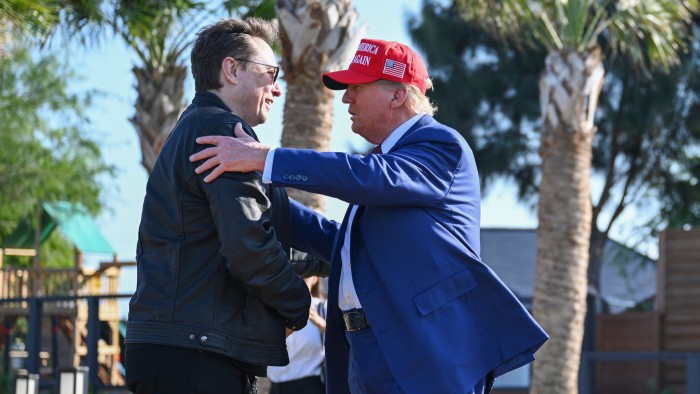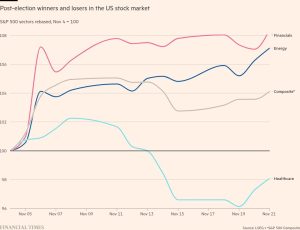Will Musk and Trump fall out?

This article is an on-site version of our Swamp Notes newsletter. Premium subscribers can sign up here to get the newsletter delivered every Monday and Friday. Standard subscribers can upgrade to Premium here, or explore all FT newsletters
In 1972, Henry Kissinger called Time’s editor-in-chief and “begged” to have his name removed as the magazine’s joint “men of the year” — the other being his boss, Richard M Nixon. “To be given equal treatment with the president of the United States was for me almost suicidal,” Kissinger recalled. The magazine brushed aside Kissinger’s desperate entreaties. The two men duly shared the cover. The German-born national security adviser’s role in a highly consequential administration was too central to be ignored.
Eight weeks before Donald Trump takes office for a second time, that role now belongs to Elon Musk. Trump’s vice-president, JD Vance, has almost dropped out of view. Musk, on the other hand, is everywhere to be seen. From the Mar-a-Lago interviews for the administration’s top jobs to a semi-clandestine meeting with Iran’s ambassador to the UN, Musk seems to have a finger in every Trumpian pie. Musk has even been accorded the honour of having his own theme tune whenever he walks into the Mar-a-Lago dining room: David Bowie’s “Space Oddity”. Trump, who controls the iPad with the musical entrées, is usually announced with his campaign’s somewhat counter-intuitive score, the Village People’s “YMCA” (a long-standing anthem of the gay community).
The media has started to refer to Musk as “co-president” with Trump. Musk is revelling in all the attention. No matter how rich Musk is (his net worth has surged to over $300bn since the election), his power is no match for what is destined to be the most supercharged imperial presidency in modern US history. Trump does not like sharing the limelight for long. Something tells me, however, that Musk has no idea how close he is flying to the sun. Musk dines with Trump, he flies with Trump, he plays golf with Trump and he is there at Mar-a-Lago even when Trump isn’t. “He likes this place,” Trump quipped last week. “I can’t get him out of here. He just likes this place.” But he added: “And you know what? I like having him here, too.”
Trump owes Musk a lot. In addition to the $119mn of his own money that Musk spent supporting Trump’s campaign, he effectively made a $44bn in-kind donation by giving over his social media platform X to the Trumpian cause (the price Musk paid for what was formerly Twitter). The site’s overt algorithmic bias has sparked a liberal exodus to Bluesky, which has more than doubled its user base to around 20mn since September. For clues about what Trump might do next, Musk’s postings are now almost as indicative as Trump’s infamous nocturnal tweets were during his first presidency. Musk’s place in the pecking order is perfectly captured by the now ubiquitous photo of him seated next to Trump on the president-elect’s plane. Opposite them are Donald Trump Jr and Robert F Kennedy Jr — all eating their own McDonald’s takeaway. Standing behind them, and straining to be included in the picture, is Mike Johnson, Speaker of the House of Representatives, and third in line to the presidency. The second in line, Vance, is not there.
In Trump’s world, diverting attention from the big man is usually enough for a falling out. Trump is notorious for exaggerating how often he has been on the cover of Time (a very outdated measure of prominence nowadays). But policy frictions are also visible. Musk lobbied intensively to get Howard Lutnick, the chief executive of brokerage firm, Cantor Fitzgerald, as Trump’s Treasury secretary. Lutnick was instead given a beefed-up US Department of Commerce. It remains to be seen who takes the Treasury. If it is Scott Bessent, the former chief investment officer for George Soros, that will be a sign that Musk is not always getting his way. Musk has somewhat rashly posted that Bessent represents “business-as-usual”, which is “driving America bankrupt”. Then there are Musk’s China interests. With a large Tesla plant in Shanghai, Musk is on the anti-decoupling side of what is an otherwise very hawkish administration.
Musk and Vivek Ramaswamy are set to be co-heads of the so-called department for government efficiency, a non-government non-department that claims to have the license to gut Washington’s agencies and slash spending. Doge has no formal power. But Musk’s megaphone is arguably the biggest in the world — only Trump could claim to have a louder one. If Musk discovers, as I suspect he will, that his own bully pulpit is no match for Congress’s jealously-guarded power of the purse, he is unlikely to concede the fight quietly. At some point, Trump would have to adjudicate who will prevail. Do not bet on Musk.
In sum, I see a train wreck in process — and not in slow motion. Hannah, you covered Musk’s takeover of Twitter and watched him break plates. He removed 80 per cent of the social media company’s staff, including the content moderators, and sees that experience as a template for how to reform the US federal government. What does that tell us about how long he will last with Trump? Is there any parallel between another US president and the plutocrat of his day?
Recommended reading
-
My column this week looks at Trump’s plans to deconstruct the administrative state — a project with which Musk is intimately connected. The high charlatan-to-normal ratio of Trump’s picks should be taken as a clear sign of intent. “Rome was not destroyed by outsiders,” I write. “It was the work of barbarians from within.”
-
Do also read my colleague Tabby Kinder on another Trump trade: Palantir, the company co-founded by Peter Thiel, another pro-Trump Silicon Valley libertarian. The company’s market valuation has shot up by $23bn since November 5, which now puts it ahead of Lockheed Martin. Palantir, along with privately held Anduril, and other tech companies, make up the new military industrial complex. Watch them closely.
-
Finally do read Stanford University’s Rose Gottemoeller on how Trump will need concessions from Putin to settle Ukraine, which “may be forthcoming”. Gottemoeller’s widely read FT oped came out a couple of days before Joe Biden lifted the range limits on US-supplied artillery to Ukraine, which will be helpful to Trump.
Hannah Murphy responds
Ed, posing the question to my team, my esteemed colleague Richard Waters told me he’s long the bromance, which he thinks will “run and run”. I’m less convinced about their marriage of convenience.
By all accounts, Musk’s Twitter cost-cutting push was frenetic and focused on short-term results. After slashing employees, the company was forced to beg for the return of some fired staff, who, it turned out, had vital knowledge about running the platform. Elsewhere, staff would sometimes simply refuse to pay vendors. One source described Musk making a constant refrain in the office: “Let them sue!” (Spoiler alert: some did)
To do his dirtiest work at Twitter, Musk leaned on a tight circle of sycophants, who took to sleeping on the floor at Twitter HQ to demonstrate their devotion. Musk is already seeking the same loyalty in his Doge job listings, which seek “super high-IQ small-government revolutionaries willing to work 80+ hours per week on unglamorous cost-cutting”.
But moving from bulldozing a platform he owns, to potentially coming up against Congress — and more importantly, “managing up” Trump — will require a sensitivity that is unfamiliar to Musk. Can he learn to hold his tongue — or tweets — and become the sycophant? When hosting the president-elect for an audio town hall on X ahead of the election, you could already hear Musk trying to rein in some of Trump’s blunter arguments, to little effect.
I can’t think of any parallel where a plutocrat has had the president’s ear in this way, and certainly not a Silicon Valley ego. Both paranoid and fickle, divorce is surely on the cards. The question is, how messy it will be.
Your feedback
And now a word from our Swampians . . .
In response to “Should tech giants be treated like nation states?”:
“I have to admit, I slightly disagree with you (that’s why I liked the article!).
While tech companies don’t have the legitimacy of a democratic mandate, governments are losing their legitimacy by losing effectiveness. On the other hand, private companies can be shockingly effective (think about SpaceX doing things that only governments could do decades ago).
Governments simply aren’t as capable as they were from the 1930s through 1960s (I would also argue that academia isn’t either). To retain their legitimacy, I think that governments really need to learn from the private sector about how to get things done and how to recruit (also how does academia recruit as well, which feeds into government), and that needs respect from democratically elected leaders.” — Buz M Barstow
Your feedback
We’d love to hear from you. You can email the team on [email protected], contact Ed on [email protected] and follow him on X at @EdwardGLuce. We may feature an excerpt of your response in the next newsletter
Recommended newsletters for you
White House Watch — Your essential guide to what the 2024 election means for Washington and the world. Sign up here
Unhedged — Robert Armstrong dissects the most important market trends and discusses how Wall Street’s best minds respond to them. Sign up here
#Musk #Trump #fall






